Vanuatu's Broken Dreams: Ethical and Governing Issues in Tourism
VerifiedAdded on 2020/03/16
|8
|2140
|335
Report
AI Summary
This report analyzes the ethical and governance issues within Vanuatu's tourism industry, focusing on the impact of P&O Cruises and the responsibilities of both the cruise company and the Vanuatu government. The report highlights the disparity between the promises of economic development and the reality faced by local communities, detailing issues such as inadequate infrastructure, lack of financial transparency, and the failure to empower local businesses. It explores the ethical failures of P&O Cruises in fulfilling their corporate social responsibilities, the government's shortcomings in regulating the tourism sector, and the need for greater accountability from all stakeholders. The report concludes with recommendations for rectifying the identified issues, including the cruise company investing more in the local community, the government implementing effective policies, and tourists altering their perspective towards the islanders. The report also emphasizes the role of the local community in initiating small businesses for a better livelihood.
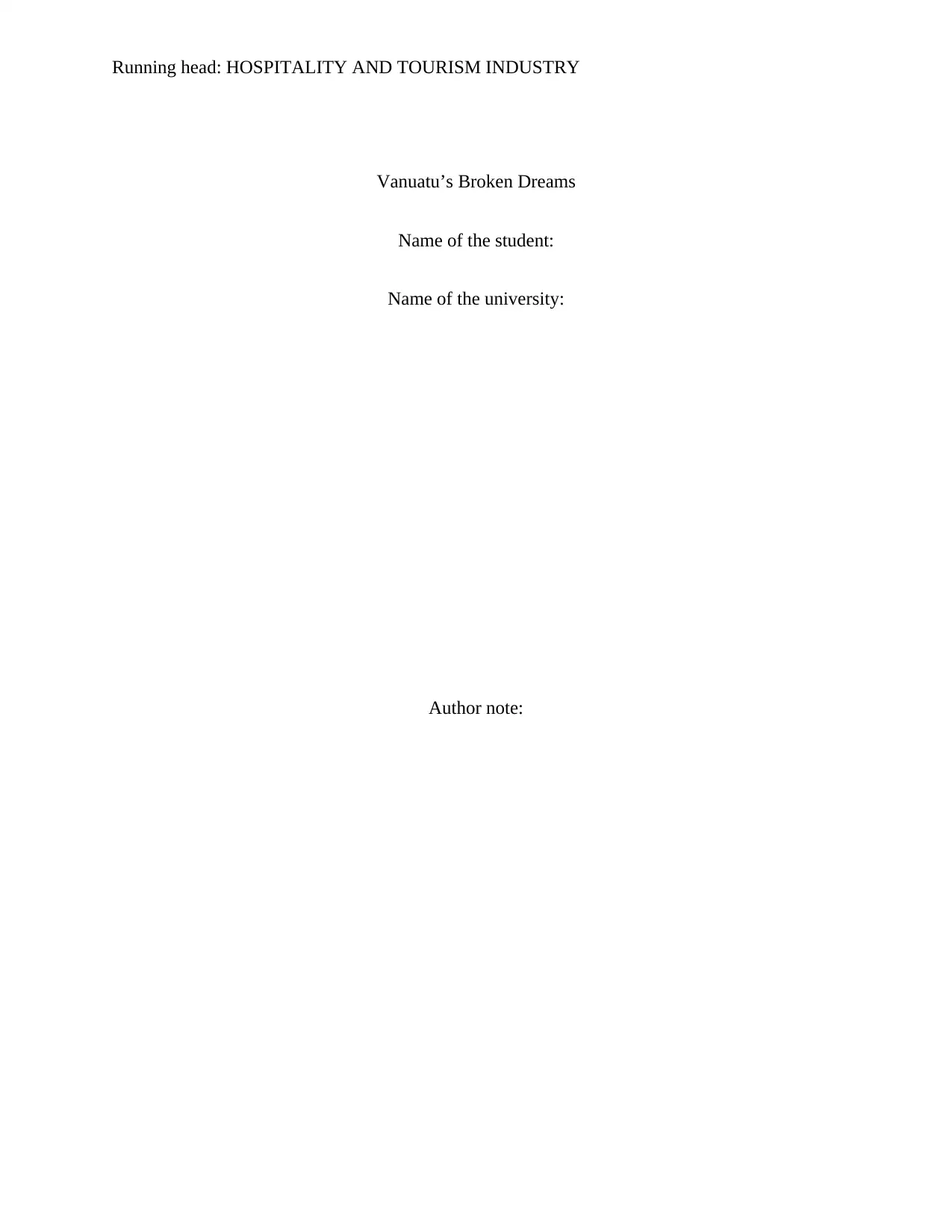
Running head: HOSPITALITY AND TOURISM INDUSTRY
Vanuatu’s Broken Dreams
Name of the student:
Name of the university:
Author note:
Vanuatu’s Broken Dreams
Name of the student:
Name of the university:
Author note:
Paraphrase This Document
Need a fresh take? Get an instant paraphrase of this document with our AI Paraphraser
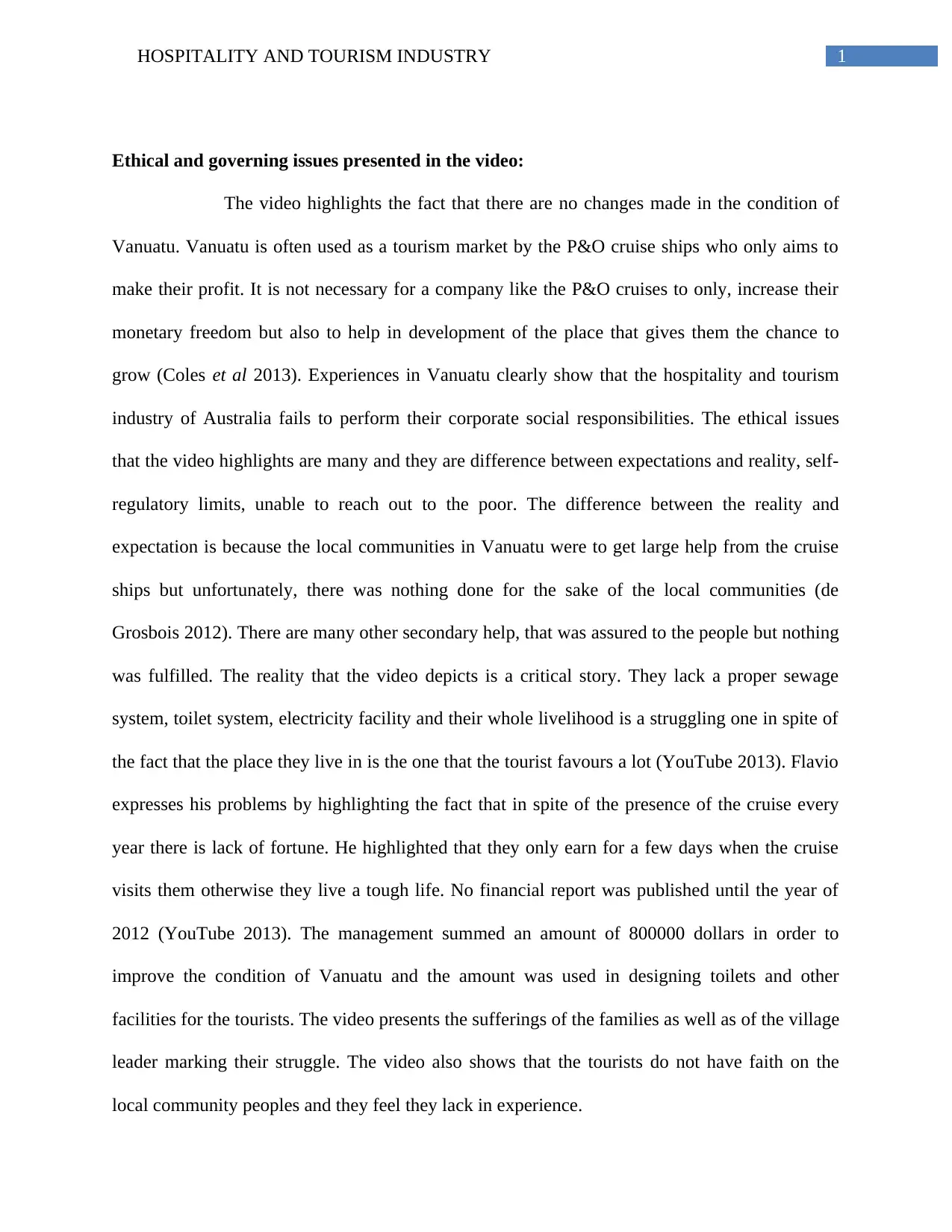
1HOSPITALITY AND TOURISM INDUSTRY
Ethical and governing issues presented in the video:
The video highlights the fact that there are no changes made in the condition of
Vanuatu. Vanuatu is often used as a tourism market by the P&O cruise ships who only aims to
make their profit. It is not necessary for a company like the P&O cruises to only, increase their
monetary freedom but also to help in development of the place that gives them the chance to
grow (Coles et al 2013). Experiences in Vanuatu clearly show that the hospitality and tourism
industry of Australia fails to perform their corporate social responsibilities. The ethical issues
that the video highlights are many and they are difference between expectations and reality, self-
regulatory limits, unable to reach out to the poor. The difference between the reality and
expectation is because the local communities in Vanuatu were to get large help from the cruise
ships but unfortunately, there was nothing done for the sake of the local communities (de
Grosbois 2012). There are many other secondary help, that was assured to the people but nothing
was fulfilled. The reality that the video depicts is a critical story. They lack a proper sewage
system, toilet system, electricity facility and their whole livelihood is a struggling one in spite of
the fact that the place they live in is the one that the tourist favours a lot (YouTube 2013). Flavio
expresses his problems by highlighting the fact that in spite of the presence of the cruise every
year there is lack of fortune. He highlighted that they only earn for a few days when the cruise
visits them otherwise they live a tough life. No financial report was published until the year of
2012 (YouTube 2013). The management summed an amount of 800000 dollars in order to
improve the condition of Vanuatu and the amount was used in designing toilets and other
facilities for the tourists. The video presents the sufferings of the families as well as of the village
leader marking their struggle. The video also shows that the tourists do not have faith on the
local community peoples and they feel they lack in experience.
Ethical and governing issues presented in the video:
The video highlights the fact that there are no changes made in the condition of
Vanuatu. Vanuatu is often used as a tourism market by the P&O cruise ships who only aims to
make their profit. It is not necessary for a company like the P&O cruises to only, increase their
monetary freedom but also to help in development of the place that gives them the chance to
grow (Coles et al 2013). Experiences in Vanuatu clearly show that the hospitality and tourism
industry of Australia fails to perform their corporate social responsibilities. The ethical issues
that the video highlights are many and they are difference between expectations and reality, self-
regulatory limits, unable to reach out to the poor. The difference between the reality and
expectation is because the local communities in Vanuatu were to get large help from the cruise
ships but unfortunately, there was nothing done for the sake of the local communities (de
Grosbois 2012). There are many other secondary help, that was assured to the people but nothing
was fulfilled. The reality that the video depicts is a critical story. They lack a proper sewage
system, toilet system, electricity facility and their whole livelihood is a struggling one in spite of
the fact that the place they live in is the one that the tourist favours a lot (YouTube 2013). Flavio
expresses his problems by highlighting the fact that in spite of the presence of the cruise every
year there is lack of fortune. He highlighted that they only earn for a few days when the cruise
visits them otherwise they live a tough life. No financial report was published until the year of
2012 (YouTube 2013). The management summed an amount of 800000 dollars in order to
improve the condition of Vanuatu and the amount was used in designing toilets and other
facilities for the tourists. The video presents the sufferings of the families as well as of the village
leader marking their struggle. The video also shows that the tourists do not have faith on the
local community peoples and they feel they lack in experience.
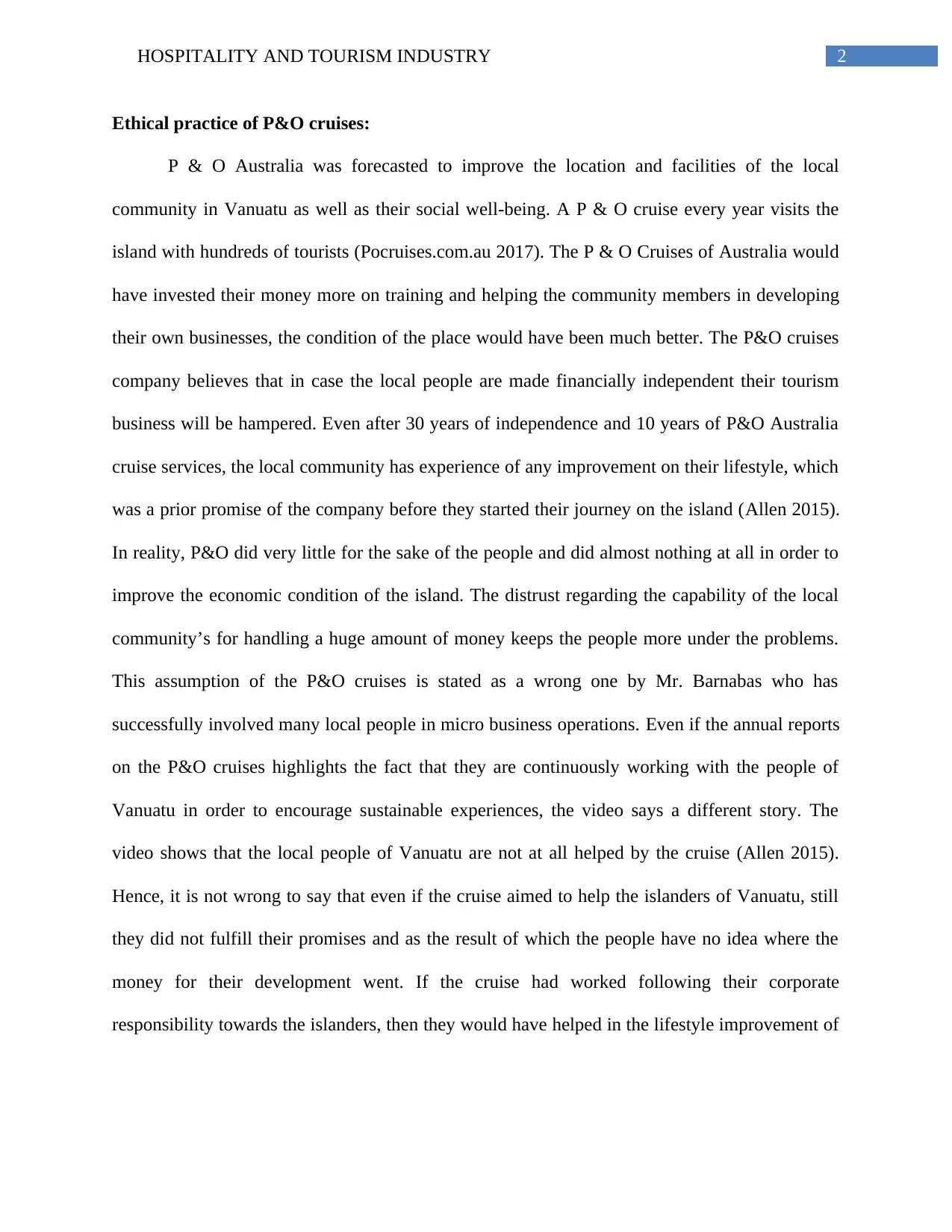
2HOSPITALITY AND TOURISM INDUSTRY
Ethical practice of P&O cruises:
P & O Australia was forecasted to improve the location and facilities of the local
community in Vanuatu as well as their social well-being. A P & O cruise every year visits the
island with hundreds of tourists (Pocruises.com.au 2017). The P & O Cruises of Australia would
have invested their money more on training and helping the community members in developing
their own businesses, the condition of the place would have been much better. The P&O cruises
company believes that in case the local people are made financially independent their tourism
business will be hampered. Even after 30 years of independence and 10 years of P&O Australia
cruise services, the local community has experience of any improvement on their lifestyle, which
was a prior promise of the company before they started their journey on the island (Allen 2015).
In reality, P&O did very little for the sake of the people and did almost nothing at all in order to
improve the economic condition of the island. The distrust regarding the capability of the local
community’s for handling a huge amount of money keeps the people more under the problems.
This assumption of the P&O cruises is stated as a wrong one by Mr. Barnabas who has
successfully involved many local people in micro business operations. Even if the annual reports
on the P&O cruises highlights the fact that they are continuously working with the people of
Vanuatu in order to encourage sustainable experiences, the video says a different story. The
video shows that the local people of Vanuatu are not at all helped by the cruise (Allen 2015).
Hence, it is not wrong to say that even if the cruise aimed to help the islanders of Vanuatu, still
they did not fulfill their promises and as the result of which the people have no idea where the
money for their development went. If the cruise had worked following their corporate
responsibility towards the islanders, then they would have helped in the lifestyle improvement of
Ethical practice of P&O cruises:
P & O Australia was forecasted to improve the location and facilities of the local
community in Vanuatu as well as their social well-being. A P & O cruise every year visits the
island with hundreds of tourists (Pocruises.com.au 2017). The P & O Cruises of Australia would
have invested their money more on training and helping the community members in developing
their own businesses, the condition of the place would have been much better. The P&O cruises
company believes that in case the local people are made financially independent their tourism
business will be hampered. Even after 30 years of independence and 10 years of P&O Australia
cruise services, the local community has experience of any improvement on their lifestyle, which
was a prior promise of the company before they started their journey on the island (Allen 2015).
In reality, P&O did very little for the sake of the people and did almost nothing at all in order to
improve the economic condition of the island. The distrust regarding the capability of the local
community’s for handling a huge amount of money keeps the people more under the problems.
This assumption of the P&O cruises is stated as a wrong one by Mr. Barnabas who has
successfully involved many local people in micro business operations. Even if the annual reports
on the P&O cruises highlights the fact that they are continuously working with the people of
Vanuatu in order to encourage sustainable experiences, the video says a different story. The
video shows that the local people of Vanuatu are not at all helped by the cruise (Allen 2015).
Hence, it is not wrong to say that even if the cruise aimed to help the islanders of Vanuatu, still
they did not fulfill their promises and as the result of which the people have no idea where the
money for their development went. If the cruise had worked following their corporate
responsibility towards the islanders, then they would have helped in the lifestyle improvement of
⊘ This is a preview!⊘
Do you want full access?
Subscribe today to unlock all pages.

Trusted by 1+ million students worldwide
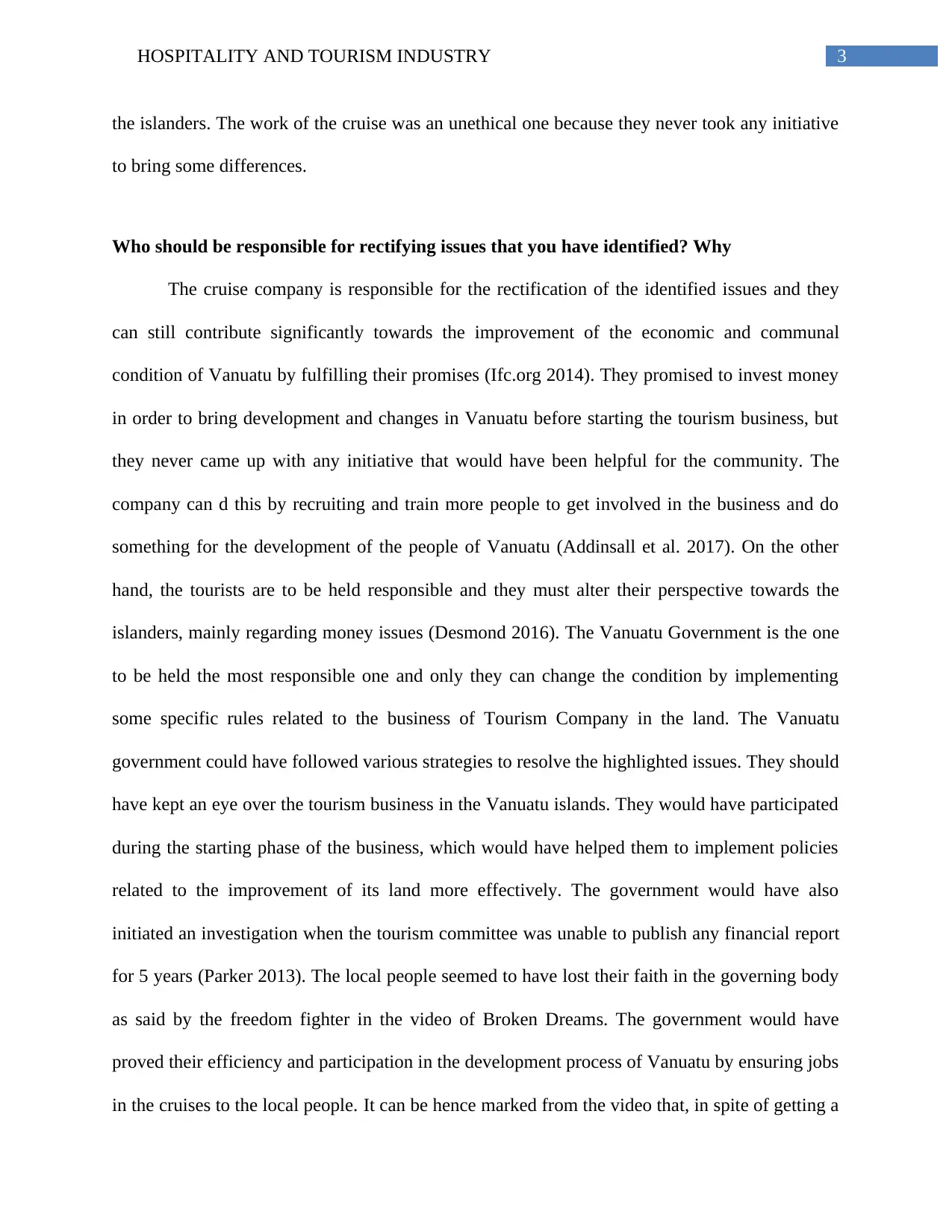
3HOSPITALITY AND TOURISM INDUSTRY
the islanders. The work of the cruise was an unethical one because they never took any initiative
to bring some differences.
Who should be responsible for rectifying issues that you have identified? Why
The cruise company is responsible for the rectification of the identified issues and they
can still contribute significantly towards the improvement of the economic and communal
condition of Vanuatu by fulfilling their promises (Ifc.org 2014). They promised to invest money
in order to bring development and changes in Vanuatu before starting the tourism business, but
they never came up with any initiative that would have been helpful for the community. The
company can d this by recruiting and train more people to get involved in the business and do
something for the development of the people of Vanuatu (Addinsall et al. 2017). On the other
hand, the tourists are to be held responsible and they must alter their perspective towards the
islanders, mainly regarding money issues (Desmond 2016). The Vanuatu Government is the one
to be held the most responsible one and only they can change the condition by implementing
some specific rules related to the business of Tourism Company in the land. The Vanuatu
government could have followed various strategies to resolve the highlighted issues. They should
have kept an eye over the tourism business in the Vanuatu islands. They would have participated
during the starting phase of the business, which would have helped them to implement policies
related to the improvement of its land more effectively. The government would have also
initiated an investigation when the tourism committee was unable to publish any financial report
for 5 years (Parker 2013). The local people seemed to have lost their faith in the governing body
as said by the freedom fighter in the video of Broken Dreams. The government would have
proved their efficiency and participation in the development process of Vanuatu by ensuring jobs
in the cruises to the local people. It can be hence marked from the video that, in spite of getting a
the islanders. The work of the cruise was an unethical one because they never took any initiative
to bring some differences.
Who should be responsible for rectifying issues that you have identified? Why
The cruise company is responsible for the rectification of the identified issues and they
can still contribute significantly towards the improvement of the economic and communal
condition of Vanuatu by fulfilling their promises (Ifc.org 2014). They promised to invest money
in order to bring development and changes in Vanuatu before starting the tourism business, but
they never came up with any initiative that would have been helpful for the community. The
company can d this by recruiting and train more people to get involved in the business and do
something for the development of the people of Vanuatu (Addinsall et al. 2017). On the other
hand, the tourists are to be held responsible and they must alter their perspective towards the
islanders, mainly regarding money issues (Desmond 2016). The Vanuatu Government is the one
to be held the most responsible one and only they can change the condition by implementing
some specific rules related to the business of Tourism Company in the land. The Vanuatu
government could have followed various strategies to resolve the highlighted issues. They should
have kept an eye over the tourism business in the Vanuatu islands. They would have participated
during the starting phase of the business, which would have helped them to implement policies
related to the improvement of its land more effectively. The government would have also
initiated an investigation when the tourism committee was unable to publish any financial report
for 5 years (Parker 2013). The local people seemed to have lost their faith in the governing body
as said by the freedom fighter in the video of Broken Dreams. The government would have
proved their efficiency and participation in the development process of Vanuatu by ensuring jobs
in the cruises to the local people. It can be hence marked from the video that, in spite of getting a
Paraphrase This Document
Need a fresh take? Get an instant paraphrase of this document with our AI Paraphraser
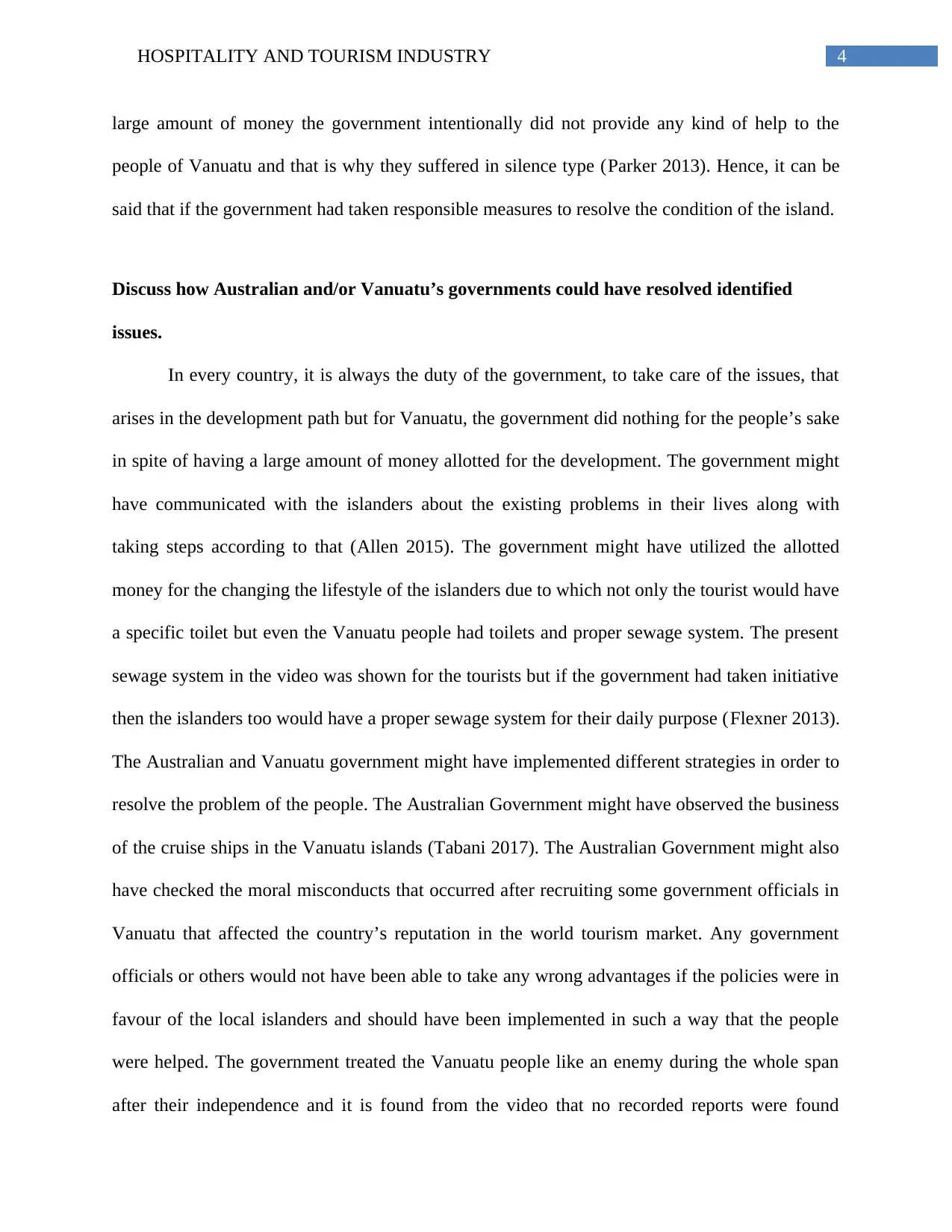
4HOSPITALITY AND TOURISM INDUSTRY
large amount of money the government intentionally did not provide any kind of help to the
people of Vanuatu and that is why they suffered in silence type (Parker 2013). Hence, it can be
said that if the government had taken responsible measures to resolve the condition of the island.
Discuss how Australian and/or Vanuatu’s governments could have resolved identified
issues.
In every country, it is always the duty of the government, to take care of the issues, that
arises in the development path but for Vanuatu, the government did nothing for the people’s sake
in spite of having a large amount of money allotted for the development. The government might
have communicated with the islanders about the existing problems in their lives along with
taking steps according to that (Allen 2015). The government might have utilized the allotted
money for the changing the lifestyle of the islanders due to which not only the tourist would have
a specific toilet but even the Vanuatu people had toilets and proper sewage system. The present
sewage system in the video was shown for the tourists but if the government had taken initiative
then the islanders too would have a proper sewage system for their daily purpose (Flexner 2013).
The Australian and Vanuatu government might have implemented different strategies in order to
resolve the problem of the people. The Australian Government might have observed the business
of the cruise ships in the Vanuatu islands (Tabani 2017). The Australian Government might also
have checked the moral misconducts that occurred after recruiting some government officials in
Vanuatu that affected the country’s reputation in the world tourism market. Any government
officials or others would not have been able to take any wrong advantages if the policies were in
favour of the local islanders and should have been implemented in such a way that the people
were helped. The government treated the Vanuatu people like an enemy during the whole span
after their independence and it is found from the video that no recorded reports were found
large amount of money the government intentionally did not provide any kind of help to the
people of Vanuatu and that is why they suffered in silence type (Parker 2013). Hence, it can be
said that if the government had taken responsible measures to resolve the condition of the island.
Discuss how Australian and/or Vanuatu’s governments could have resolved identified
issues.
In every country, it is always the duty of the government, to take care of the issues, that
arises in the development path but for Vanuatu, the government did nothing for the people’s sake
in spite of having a large amount of money allotted for the development. The government might
have communicated with the islanders about the existing problems in their lives along with
taking steps according to that (Allen 2015). The government might have utilized the allotted
money for the changing the lifestyle of the islanders due to which not only the tourist would have
a specific toilet but even the Vanuatu people had toilets and proper sewage system. The present
sewage system in the video was shown for the tourists but if the government had taken initiative
then the islanders too would have a proper sewage system for their daily purpose (Flexner 2013).
The Australian and Vanuatu government might have implemented different strategies in order to
resolve the problem of the people. The Australian Government might have observed the business
of the cruise ships in the Vanuatu islands (Tabani 2017). The Australian Government might also
have checked the moral misconducts that occurred after recruiting some government officials in
Vanuatu that affected the country’s reputation in the world tourism market. Any government
officials or others would not have been able to take any wrong advantages if the policies were in
favour of the local islanders and should have been implemented in such a way that the people
were helped. The government treated the Vanuatu people like an enemy during the whole span
after their independence and it is found from the video that no recorded reports were found
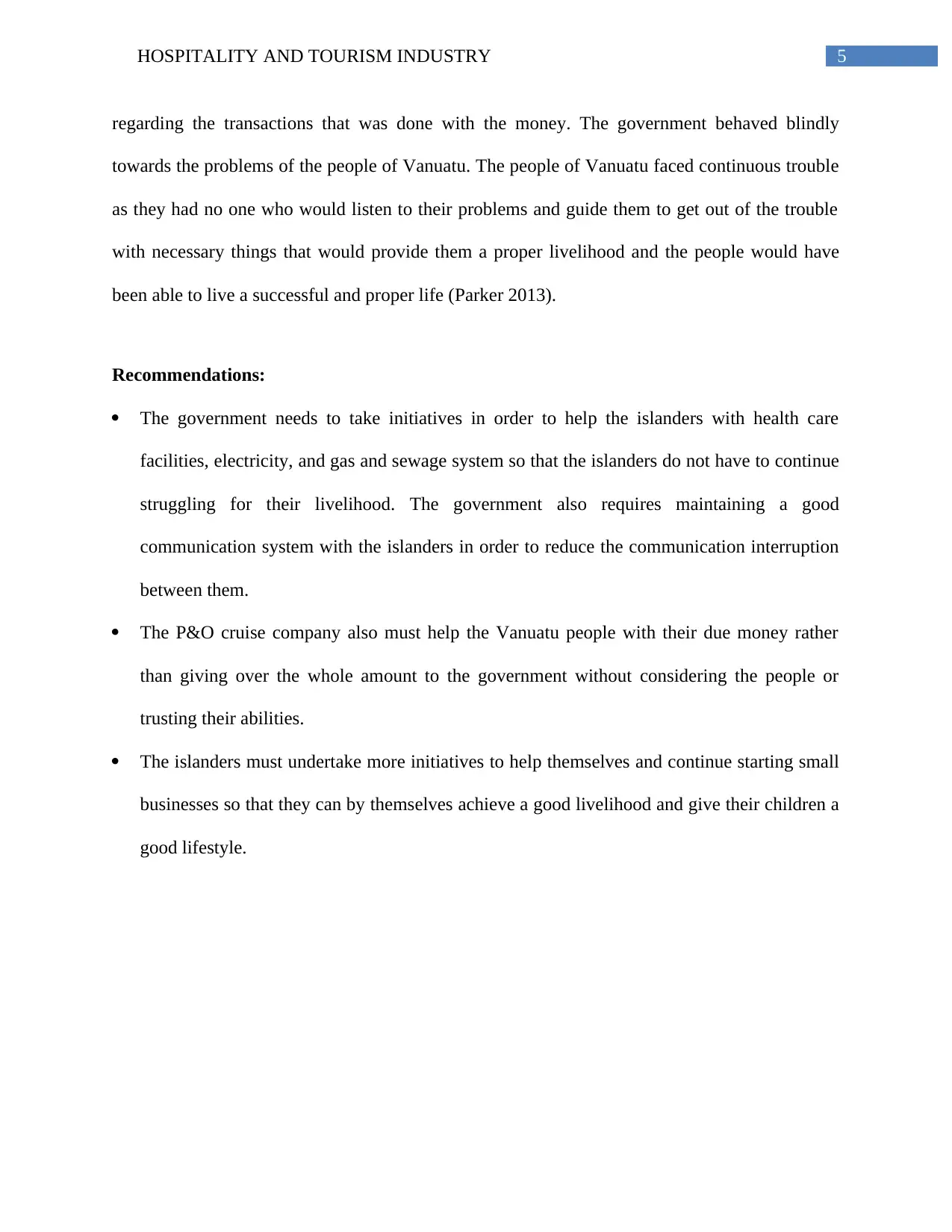
5HOSPITALITY AND TOURISM INDUSTRY
regarding the transactions that was done with the money. The government behaved blindly
towards the problems of the people of Vanuatu. The people of Vanuatu faced continuous trouble
as they had no one who would listen to their problems and guide them to get out of the trouble
with necessary things that would provide them a proper livelihood and the people would have
been able to live a successful and proper life (Parker 2013).
Recommendations:
The government needs to take initiatives in order to help the islanders with health care
facilities, electricity, and gas and sewage system so that the islanders do not have to continue
struggling for their livelihood. The government also requires maintaining a good
communication system with the islanders in order to reduce the communication interruption
between them.
The P&O cruise company also must help the Vanuatu people with their due money rather
than giving over the whole amount to the government without considering the people or
trusting their abilities.
The islanders must undertake more initiatives to help themselves and continue starting small
businesses so that they can by themselves achieve a good livelihood and give their children a
good lifestyle.
regarding the transactions that was done with the money. The government behaved blindly
towards the problems of the people of Vanuatu. The people of Vanuatu faced continuous trouble
as they had no one who would listen to their problems and guide them to get out of the trouble
with necessary things that would provide them a proper livelihood and the people would have
been able to live a successful and proper life (Parker 2013).
Recommendations:
The government needs to take initiatives in order to help the islanders with health care
facilities, electricity, and gas and sewage system so that the islanders do not have to continue
struggling for their livelihood. The government also requires maintaining a good
communication system with the islanders in order to reduce the communication interruption
between them.
The P&O cruise company also must help the Vanuatu people with their due money rather
than giving over the whole amount to the government without considering the people or
trusting their abilities.
The islanders must undertake more initiatives to help themselves and continue starting small
businesses so that they can by themselves achieve a good livelihood and give their children a
good lifestyle.
⊘ This is a preview!⊘
Do you want full access?
Subscribe today to unlock all pages.

Trusted by 1+ million students worldwide
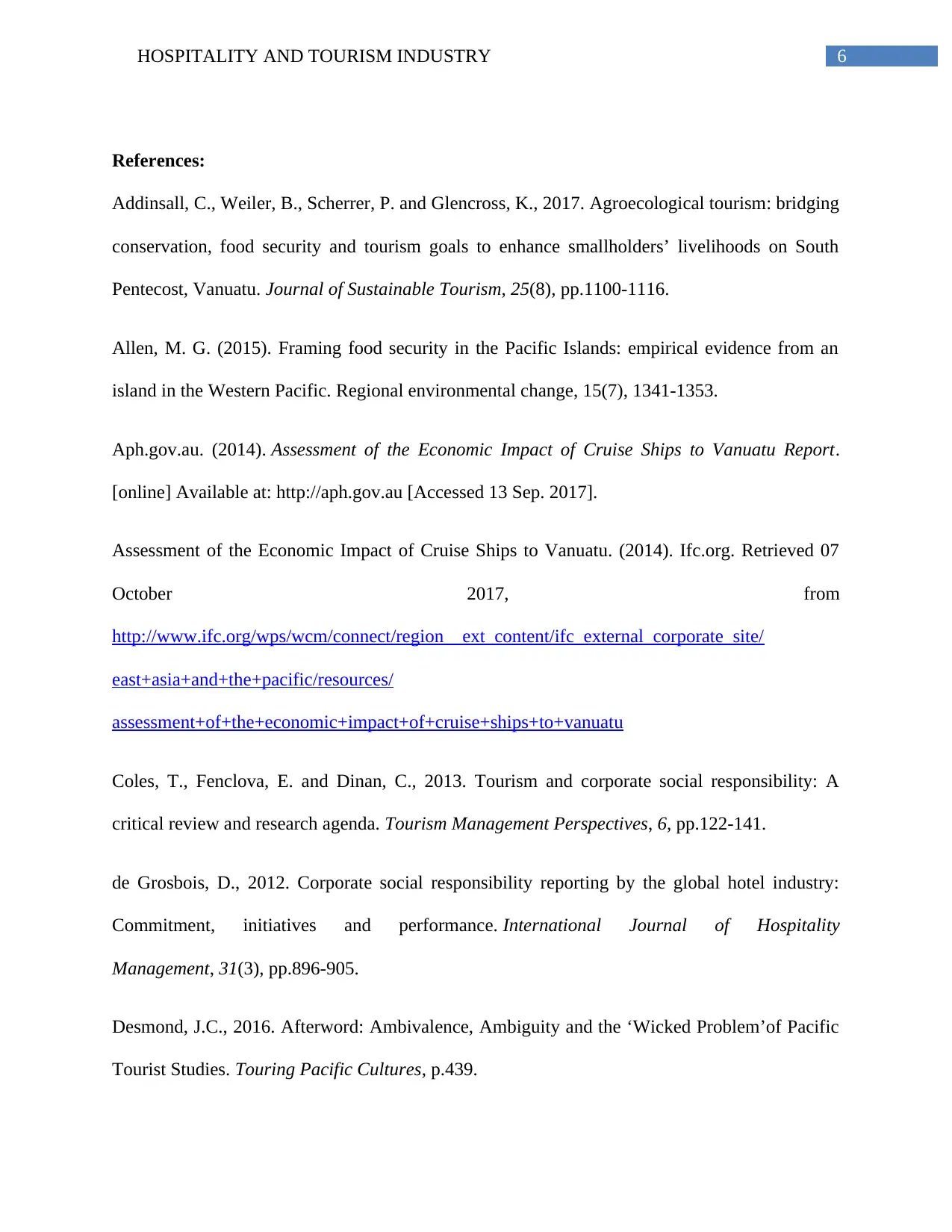
6HOSPITALITY AND TOURISM INDUSTRY
References:
Addinsall, C., Weiler, B., Scherrer, P. and Glencross, K., 2017. Agroecological tourism: bridging
conservation, food security and tourism goals to enhance smallholders’ livelihoods on South
Pentecost, Vanuatu. Journal of Sustainable Tourism, 25(8), pp.1100-1116.
Allen, M. G. (2015). Framing food security in the Pacific Islands: empirical evidence from an
island in the Western Pacific. Regional environmental change, 15(7), 1341-1353.
Aph.gov.au. (2014). Assessment of the Economic Impact of Cruise Ships to Vanuatu Report.
[online] Available at: http://aph.gov.au [Accessed 13 Sep. 2017].
Assessment of the Economic Impact of Cruise Ships to Vanuatu. (2014). Ifc.org. Retrieved 07
October 2017, from
http://www.ifc.org/wps/wcm/connect/region__ext_content/ifc_external_corporate_site/
east+asia+and+the+pacific/resources/
assessment+of+the+economic+impact+of+cruise+ships+to+vanuatu
Coles, T., Fenclova, E. and Dinan, C., 2013. Tourism and corporate social responsibility: A
critical review and research agenda. Tourism Management Perspectives, 6, pp.122-141.
de Grosbois, D., 2012. Corporate social responsibility reporting by the global hotel industry:
Commitment, initiatives and performance. International Journal of Hospitality
Management, 31(3), pp.896-905.
Desmond, J.C., 2016. Afterword: Ambivalence, Ambiguity and the ‘Wicked Problem’of Pacific
Tourist Studies. Touring Pacific Cultures, p.439.
References:
Addinsall, C., Weiler, B., Scherrer, P. and Glencross, K., 2017. Agroecological tourism: bridging
conservation, food security and tourism goals to enhance smallholders’ livelihoods on South
Pentecost, Vanuatu. Journal of Sustainable Tourism, 25(8), pp.1100-1116.
Allen, M. G. (2015). Framing food security in the Pacific Islands: empirical evidence from an
island in the Western Pacific. Regional environmental change, 15(7), 1341-1353.
Aph.gov.au. (2014). Assessment of the Economic Impact of Cruise Ships to Vanuatu Report.
[online] Available at: http://aph.gov.au [Accessed 13 Sep. 2017].
Assessment of the Economic Impact of Cruise Ships to Vanuatu. (2014). Ifc.org. Retrieved 07
October 2017, from
http://www.ifc.org/wps/wcm/connect/region__ext_content/ifc_external_corporate_site/
east+asia+and+the+pacific/resources/
assessment+of+the+economic+impact+of+cruise+ships+to+vanuatu
Coles, T., Fenclova, E. and Dinan, C., 2013. Tourism and corporate social responsibility: A
critical review and research agenda. Tourism Management Perspectives, 6, pp.122-141.
de Grosbois, D., 2012. Corporate social responsibility reporting by the global hotel industry:
Commitment, initiatives and performance. International Journal of Hospitality
Management, 31(3), pp.896-905.
Desmond, J.C., 2016. Afterword: Ambivalence, Ambiguity and the ‘Wicked Problem’of Pacific
Tourist Studies. Touring Pacific Cultures, p.439.
Paraphrase This Document
Need a fresh take? Get an instant paraphrase of this document with our AI Paraphraser
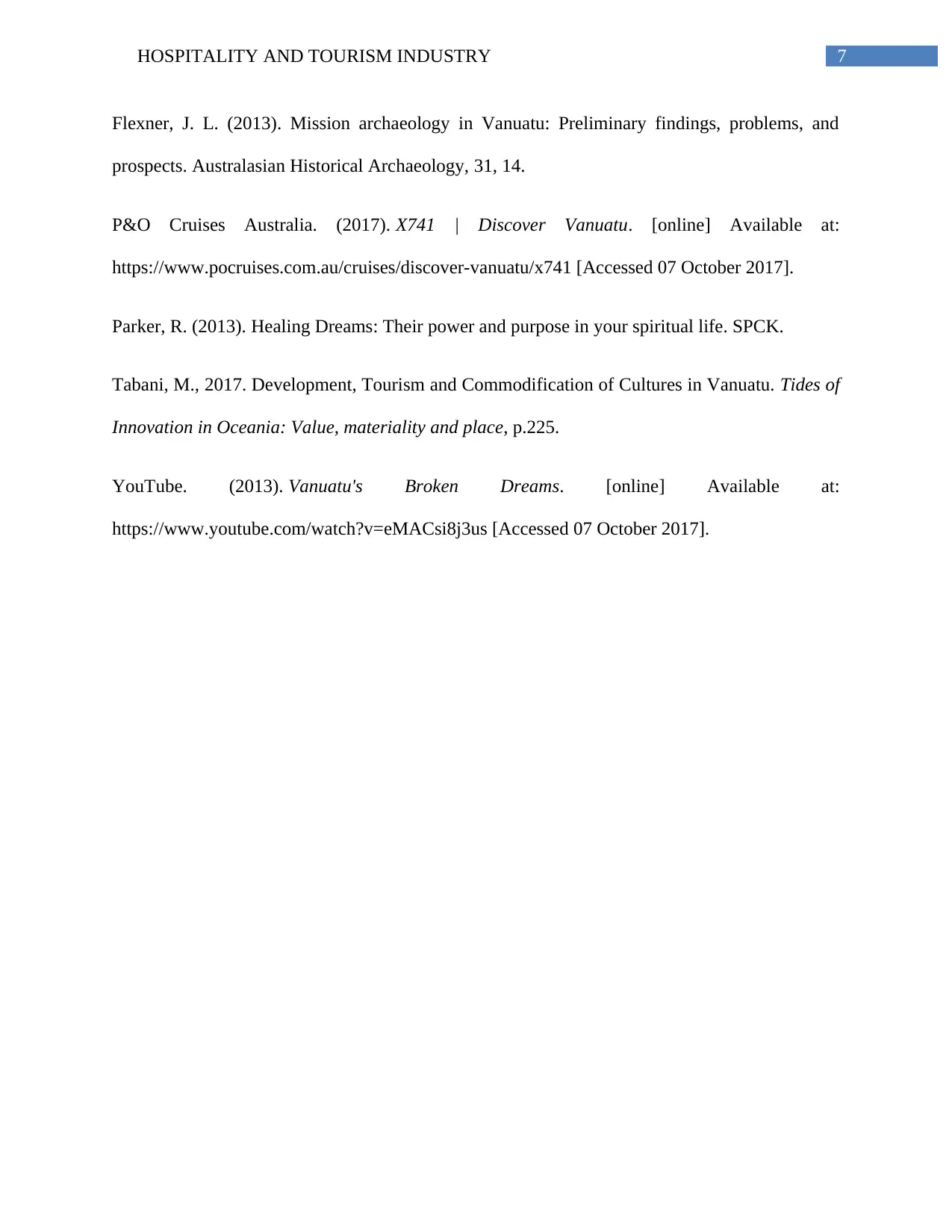
7HOSPITALITY AND TOURISM INDUSTRY
Flexner, J. L. (2013). Mission archaeology in Vanuatu: Preliminary findings, problems, and
prospects. Australasian Historical Archaeology, 31, 14.
P&O Cruises Australia. (2017). X741 | Discover Vanuatu. [online] Available at:
https://www.pocruises.com.au/cruises/discover-vanuatu/x741 [Accessed 07 October 2017].
Parker, R. (2013). Healing Dreams: Their power and purpose in your spiritual life. SPCK.
Tabani, M., 2017. Development, Tourism and Commodification of Cultures in Vanuatu. Tides of
Innovation in Oceania: Value, materiality and place, p.225.
YouTube. (2013). Vanuatu's Broken Dreams. [online] Available at:
https://www.youtube.com/watch?v=eMACsi8j3us [Accessed 07 October 2017].
Flexner, J. L. (2013). Mission archaeology in Vanuatu: Preliminary findings, problems, and
prospects. Australasian Historical Archaeology, 31, 14.
P&O Cruises Australia. (2017). X741 | Discover Vanuatu. [online] Available at:
https://www.pocruises.com.au/cruises/discover-vanuatu/x741 [Accessed 07 October 2017].
Parker, R. (2013). Healing Dreams: Their power and purpose in your spiritual life. SPCK.
Tabani, M., 2017. Development, Tourism and Commodification of Cultures in Vanuatu. Tides of
Innovation in Oceania: Value, materiality and place, p.225.
YouTube. (2013). Vanuatu's Broken Dreams. [online] Available at:
https://www.youtube.com/watch?v=eMACsi8j3us [Accessed 07 October 2017].
1 out of 8
Related Documents
Your All-in-One AI-Powered Toolkit for Academic Success.
+13062052269
info@desklib.com
Available 24*7 on WhatsApp / Email
![[object Object]](/_next/static/media/star-bottom.7253800d.svg)
Unlock your academic potential
Copyright © 2020–2026 A2Z Services. All Rights Reserved. Developed and managed by ZUCOL.





